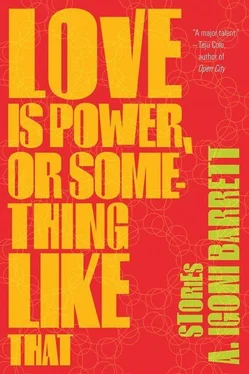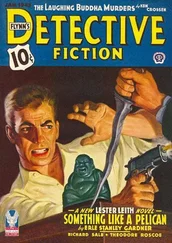When Méneia returned from the kitchen Granma Anabraba turned to her in one final effort. “Your brother wants to start heading for Adaka Boro this night.”
Méneia placed the hurricane lamp on the table and adjusted the slant of its light so that it fell away from the look that was on her brother’s face. “Are you sure, Dimié?” she asked.
“Yes.”
She met her grandmother’s bewildered gaze and shook her head. Granma Anabraba dropped her arms. They fell into her lap with a clap.
“Okay, Dimié, let me pack some food for Mma,” Méneia said.
When Méneia reappeared with a plastic bag swinging in her hand, Granma Anabraba rose to meet her. She took the hurricane lamp, and, mumbling at each step about the foolishness of youth, she went into her room. When she returned, her bare feet scuffing the floor, she handed a fold of naira notes to Dimié Abrakasa. “For your transport. Plus a little something.”
“Thank you, Granma.” Dimié Abrakasa picked up the bag that Méneia had set down beside his chair. With his grandmother and sister following behind, he walked to the door.
“Hurry, it’s not safe,” Granma Anabraba said as she unlocked the door. Thrusting the keys at Méneia, she directed: “Follow him and open the gate. Remember to check before you open it, and lock it immediately after he passes.” She placed a hand, gnarled and knobby like a mandrake root, on her grandson’s shoulder blade. “Good night, my child. Greet your mother for me. Tell her. . no, don’t worry. Hurry now, hurry.” She gave him a push, and her fingernails, for an instant, dug into the wounds on his neck.
.10 .
Dimié Abrakasa arrived to find the house asleep. The front door, because of the broken latch, was never locked. He pushed it open and stepped inside. The air in the corridor throbbed with the chirring of crickets, the scrape of rat feet, the philharmonic croak-croak-croak of toads. He walked to the door of his apartment, knocked once, and listened. He put his hand on the handle and turned it. The door opened.
The apartment was thick with darkness. He reached his hand into the plastic bag and searched for the candle and box of matches he had bought on the way over. With the care of a mole in a burrow that smelled of snake, he headed for the redwood dresser. When he came up against it, he struck a match, touched the flame to the candlewick, poured melted wax onto the dresser top, and fixed the candle. The sallow, sputtering light fell on the photograph of his mother as a frocked child, perched on her father’s knee, with her mother sitting alongside. His mother’s eyes shone with the wonder of happiness. He turned around.
Daoju Anabraba sat at the head of the bed, watching him. Her arms rested on her knees; her hands dangled. Dimié Abrakasa stepped away from the dresser and moved to where he had left the bag. He drew out a stainless steel container and a bottle of colorless liquid. As the candlelight reflected off steel and glass, the bedsprings squealed. Holding out his offering, he approached the bed. His mother leaped down to meet him. She grabbed the bottle and sniffed its cap. “Dimié, my son,” she said, her voice husky with tears. She kissed him on the forehead and cheeks — wet, slobbery kisses that slicked his skin. She took the container from his hand and placed it on the bed, then uncapped the bottle and threw back her head.
“Oh my son, my first, my only child, thank you!” she sang, and wriggled her hips in an impromptu dance before straightening up to clasp him in a hug.
Late into the night, while she nibbled the food and sucked the bottle, Daoju Anabraba apologized to her son, over and over again, for the life they were living, for her failure as a mother, for killing his grandfather. Dimié Abrakasa, a veteran of these episodes, kept his silence. Her speech grew slurred and slid farther into her throat; her eyelids sank, struggled, fell. She cried in sleep, the bottle clutched to her chest. She farted, loud and continuous. When her sobs became snores, Dimié Abrakasa rose from his seat at the foot of the bed. He freed the bottle from her grasp and placed it by the wall, where her hand, in the morning, would reach for it. Then he covered her up and blew out the light.

In the morning, when Dimié Abrakasa opened his eyes, the bulb above his head was shimmering with light. He stared at it until black spots swirled in his vision; then he turned his head aside and found his mother awake. She lay on the edge of the bed, curled up like a dead pupa, her gaze fixed on his face. He greeted her but got no response. His heartbeats punched his chest and bile rushed into his throat, turning his mouth bitter. He rose from the floor and prepared to leave the house. He was spreading out his school clothes when she climbed down from the bed, downed the remains of the bottle, tossed it aside, and leaned toward him. She swayed and licked her lips — her inflammable breath washed over his face. Mother and son stared at each other. Her gaze was reptilian in its steadiness, and his eyes, luminous from despair, were the shape of a full circle. When Daoju Anabraba, a smile playing on her chapped lips, uttered the words, “I hate your eyes, my son,” he slapped her.
Love Is Power, or Something Like That
.1 .
When the clock on the wall behind the complaints counter struck 7:00, Eghobamien Adrawus swung his legs off the sofa and undid the laces of his undersized boots. He heaved a sigh as the left boot dropped to the floor. He stretched his arms wide and corkscrewed his torso, then froze and clamped his teeth but not quickly enough to shut out the zoo-cage smell that had been hovering just beyond his consciousness and was now lodged in the roof of his mouth. His gagging sounded like a broken suction pump. Animals, he thought, and spat out a blob of mucus.
The cell at the back of the station had come alive. The prisoners had broken into their morning chant; they howled for mercy and food and invoked God’s retribution on the heads of their accusers. The stink of moving bowels wafted from within.
As his right boot fell with a thump, Eghobamien Adrawus yelled, “Sharrap before I come there!” and stamped his feet on the floor to give force to his threat. His face was a gargoyle mask of loathing.
A hush descended. It was short-lived. By the time Eghobamien Adrawus rose from the sofa, gathered his boots, and moved behind the counter to collect his rucksack, the walls of the station were reverberating with the prisoners’ cries. He opened his bag and drew out a pair of slippers and a blue adire shirt. He stepped into the slippers, dropped his boots into the bag, and undid the first button on his uniform, then snatched his bag and shirt from the countertop and rushed for the door.
In the fresh air outside, he took a deep breath. A crowd of prisoners’ relatives — with their multicolored containers of food, their crumpled clothes, and their anxious, sleep-smeared faces — was gathered underneath the gmelina tree beside the gate. On the parade ground the duty inspector was leading a troop of men through the morning drill. The green-and-white flag flapped lazily as it ascended the flagpole.
Eghobamien Adrawus undid the second button. The cold tugged at the hairs on his chest. His fingers were busy with the third button when he looked up, attracted by the flurry of activity to his right, where the cars were parked. A door banged shut and the engine of one of the police vans coughed and started. At this sound, a column of policemen who’d been standing about, killing time checking their guns and the fastenings of their helmets and bulletproof vests, lined up and jumped into the back of the van, which then rolled toward the porch, where Eghobamien Adrawus stood watching. A Black Maria pulled out from the backmost row of the park and lurched into place behind the van.
Читать дальше


![Сьюзан Кейн - Quiet [The Power of Introverts in a World That Can't Stop Talking]](/books/33084/syuzan-kejn-quiet-the-power-of-introverts-in-a-wo-thumb.webp)










